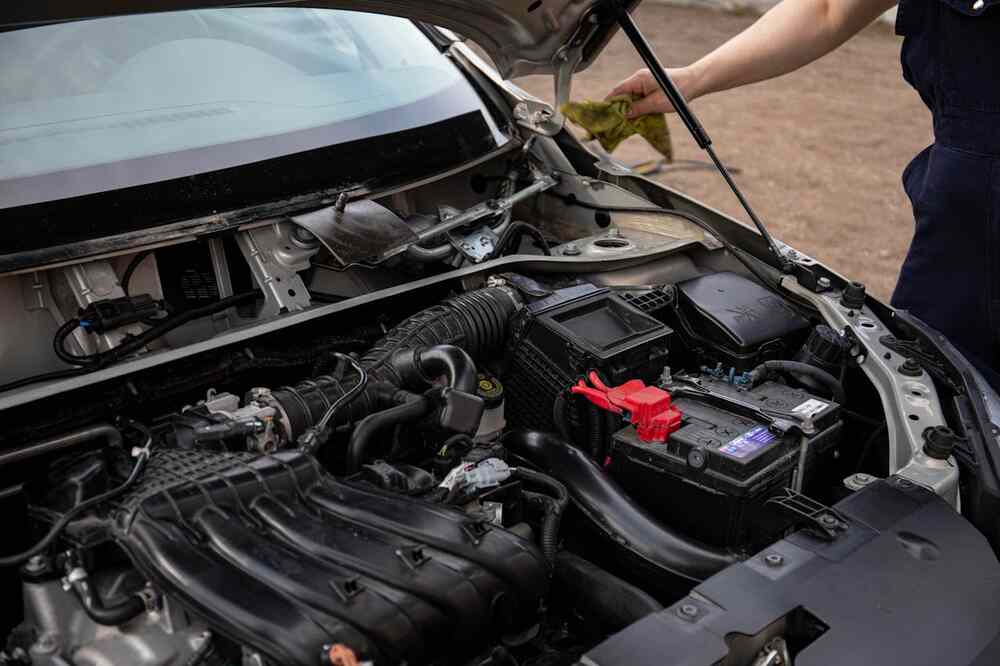How does battery work
A good car battery health is important for starting your engine and powering electrical components like lights and radio when the engine is off. It works by using a chemical reaction between lead plates and sulfuric acid to produce electrical energy. When you turn the key, the battery sends power to the starter motor, cranking the engine. While driving, the alternator recharges the battery. Maintaining a good car battery health involves regular checks, cleaning terminals, and replacing it every 3-5 years. A healthy battery delivers steady starts and solid operation of your car’s electrical systems.
Follow these 10 simple steps to check your car battery health
Your car battery health is the key for your vehicle to start and work properly. Checking the health of your car battery regularly can prevent unexpected breakdowns and extend its life. Here’s a simple guide to help you check your car battery health in just a few steps.
1. Get all your tools together
To check your car battery health, you’ll need a few tools:
Safety gloves and goggles;
A digital multimeter (available at most auto parts stores);
A battery load tester (optional but helpful);
Baking soda, water, and an old toothbrush for cleaning.
2. Guarantee your safety
Before you begin checking the car battery health, make sure your car is turned off, and the keys are removed from the ignition. Put on your safety gloves and goggles to protect yourself from any potential acid spills or battery corrosion.
3. Find the battery
Open the hood of your car and locate the battery. It is usually a rectangular box with two cables attached to it. The positive terminal is marked with a plus sign (+) and is often covered with a red cap, while the negative terminal is marked with a minus sign (-).

4. Inspect the battery
Look at the battery for any visible signs of damage, such as cracks or bulges. Check the terminals for corrosion, which appears as a white, ashy substance. If you see corrosion, mix a small amount of baking soda with water and use an old toothbrush to clean the terminals. Make sure the terminals are dry before proceeding.
5. Test the voltage with a multimeter
To test the car battery health, you’ll need a multimeter, you can usually get them from any auto stores. Set your digital multimeter to the DC voltage setting. Touch the red probe to the positive terminal and the black probe to the negative terminal. The multimeter will display the voltage reading. A healthy car battery should read between 12.4 and 12.7 volts when the engine is off. If the reading is below 12.4 volts, the battery may be weak and need recharging or replacing.

6. Perform a load test (optional)
A battery load tester can give you a more accurate assessment of your battery’s health. Connect the load tester to the battery following the manufacturer’s instructions. This device will simulate the load of starting the car and measure how well the battery handles it. If the battery fails this test, it’s a sign that it may not hold a charge well and should be replaced soon.
7. Check the battery’s age
Car battery typically lasts between three to five years. Check the battery’s age by looking for a date code on the battery casing. The code might be a combination of letters and numbers. For example, “A6” could mean January 2016. If your battery is older than three years, it might be time to consider a replacement, even if it appears to be working fine.
8. Test the alternator
Sometimes, battery issues are actually caused by a faulty alternator. The alternator charges the battery while the car is running. To check the alternator, start your car and set the multimeter to DC voltage. Touch the probes to the battery terminals as before. The reading should be between 13.7 and 14.7 volts. If it’s lower, the alternator might not be charging the battery properly.
9. Monitor battery health regularly
Regularly check your battery’s health, especially before long trips or during extreme weather conditions. Cold weather can be particularly hard on car batteries, so it’s good to check before winter sets in.
10. Know when to replace the battery
If you consistently get low voltage readings, notice slow engine starts, or your battery fails a load test, it’s time to replace it. Replacing your battery before it completely dies can save you from inconvenient breakdowns.
Book in for a car battery health test
Checking your car battery health is easy and can save you time and money. By following a few simple steps, you can make sure your car battery is in good condition and avoid unexpected problems. Regular maintenance and monitoring will help keep your car working properly.
If you prefer, we can check your car battery health for you and offer a car battery replacement if needed. Just give us a call or send us an inquiry. For your convenience, we also offer mobile mechanic services, so we can come to you. Taking care of your car battery helps prevent breakdowns and keeps your car solid.

How long do car batteries last now?
Car batteries typically last between 3 to 5 years, though the exact lifespan can vary based on several factors. Climate plays a big role, as extreme temperatures, both hot and cold, can shorten a battery’s life. Hot weather can cause the battery fluid to evaporate, while cold weather can make it harder for the battery to start the engine. Driving habits also affect battery life; short trips prevent the battery from fully recharging, whereas frequent long trips help keep the battery charged and healthy.
Regular maintenance, such as checking for corrosion, making sure the battery is clean, and keeping it properly charged, can extend its life. If a car sits unused for long periods, the battery can discharge and lose its ability to hold a charge, so using a trickle charger can help maintain the battery’s charge if you don’t drive often. To get the most out of your car battery, have it tested regularly, especially after three years of use. If you notice any issues like slow engine starts or dimming lights, it might be time to replace the battery.
Can I replace a car battery myself?
Yes, you can replace a car battery yourself. It’s a straightforward task if you follow the right procedure. You’ll need some basic tools and safety gear, like a wrench, gloves, and safety glasses. Always make sure your car is turned off and the keys are out of the ignition before starting.
For a detailed step-by-step guide, refer to our other blog post on car battery replacement. There, you’ll find all the information you need to do the job safely and correctly. If you still feel unsure or uncomfortable about the process, it’s best to get help from us.
What is a good charge for car battery?
A good charge for a car battery is between 12.4 and 12.7 volts when the engine is off. This voltage range indicates that the battery is fully charged and in good condition. If the battery voltage drops below 12.4 volts, it may need recharging. To check the charge, you can use a digital multimeter. Regularly checking your battery’s charge helps to make sure your car starts every time and the electrical systems work properly. If your battery often falls below the ideal voltage range, it might be time to consider a car battery replacement.
How to tell if a car battery is dying?
You can tell if a car battery health is really weak, almost dying, by several signs: the engine cranks slowly, headlights and interior lights are dim, the dashboard warning light is on, and there are electrical issues like malfunctioning power windows or radio. A swollen battery case and the need for frequent jump-starts are also indicators. If your battery is over 3-5 years old, it might be nearing the end of its life. If you notice these signs, it’s a good idea to get your car battery health tested and consider a battery replacement.

